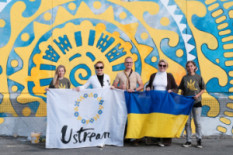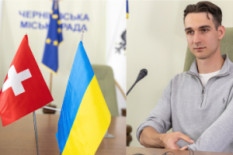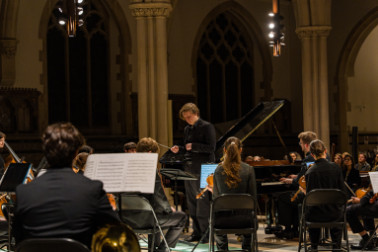Destinations.ua keeps telling stories about people who can change the world. We met Oliver in Chernihiv, where he, along with the official Swiss representation headed by the Swiss Ambassador to Ukraine and Moldova, handed over 11 buses to the city made possible by the DECIDE project.
Chernihiv, at the beginning of the full-scale invasion, lost a lion's share of its bus fleet as a result of shelling. Oliver was one of those activists who came forward with help. What moved this young Swiss man to assist the war-torn country? What personal values are shared in his decisions, and what triggers proactive civic engagement among Swiss youth? Oliver speaks his mind in this exclusive interview.
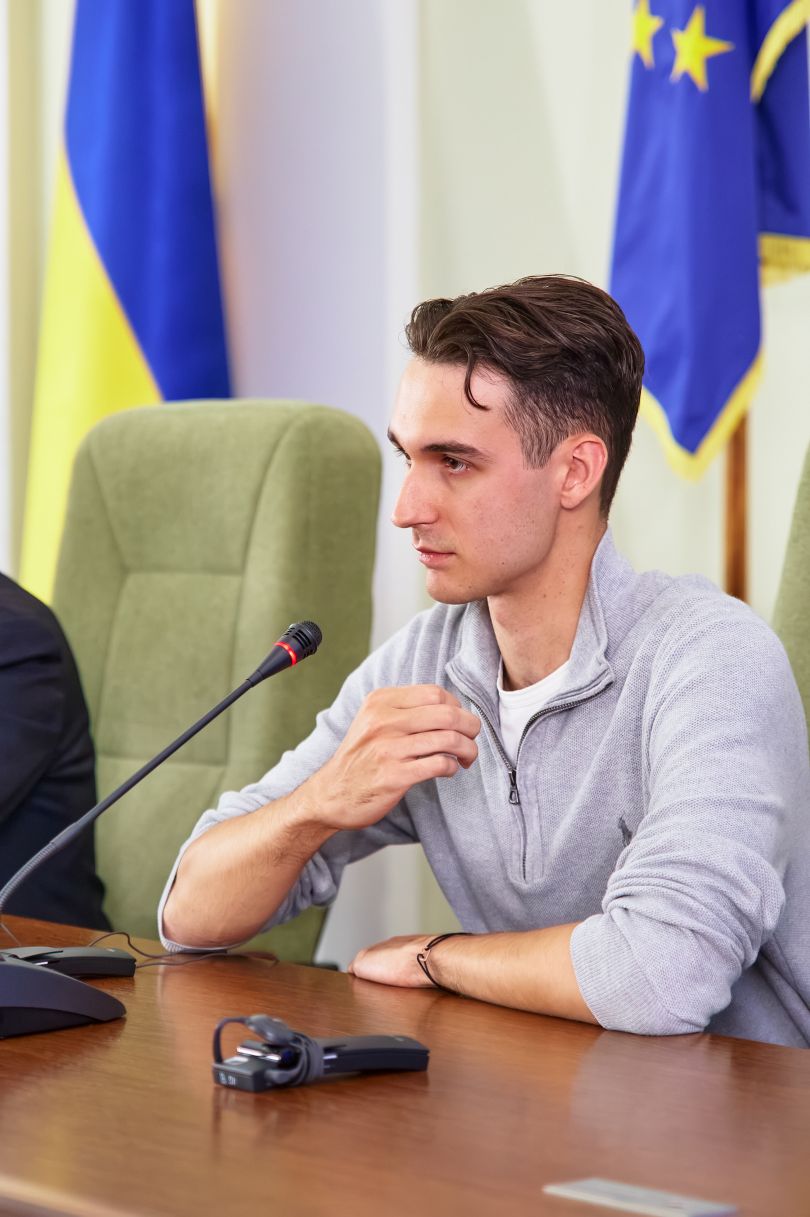
Have you been to Ukraine before, and what is your impression about the place?
Oliver: Actually, I have never been to Ukraine before the war. Last summer, for the first time, I visited Kyiv. Because I had travelled by bus, I also passed through Irpin and Bucha where the bus stopped, but Kyiv is the only major city where I spent some time. This September, again, I came back to Kyiv.
You visited Irpin and Bucha? What are your impressions from these cities? I think that, well, it must have been very touching.
Oliver: That was, indeed, impactful. The same goes for when we went to the de-occupied areas near Chernihiv before going to the city. We saw for ourselves how the Russians treated civilians during the occupation. In Irpin, for example, you see all those shelled buildings, in Bucha standing in front of the memorial, and it feels so real. It is deeply saddening.
Do you often volunteer in Switzerland?
Oliver: On a political level, yes. I have done a lot of voluntary work in Swiss politics. I founded local branches of my party. And I was on the council of the youth parliament. The goal was to activate young people for politics. I once even managed one of the biggest accounts about youth politics on Instagram in Switzerland.
But these were primarily political projects. We did a bunch of things before the buses as well, but the help for Ukraine was the first humanitarian project.
What motivated you to help Ukraine?
Oliver: One reason is that when the war started, it was like an attack on my own home.
Even though I'd never been to Ukraine, it is part of my continent, and Europe is my home. The values that matter to me are rooted in European principles. When Ukraine was attacked, it felt like an attack on those values and on my home. I realized I wanted to help in any way I could, rather than just sit back and watch.
That's a strong political statement. Would you say you're a politically active person?
Oliver: Of course, yes. Last year, I was even a candidate in the regular elections, though I didn't get elected. I was deeply involved in this campaign for a long time.
What motivates young people's political and civic engagement in general in your country?
Oliver: That's a good question, and I can only give my view on it. I think one reason is that people in Switzerland are highly engaged in state affairs because of our direct democracy.
This means that several times a year—roughly four times—all citizens over 18 can vote on national issues. And it’s not just about electing politicians. People vote on whether specific laws should be passed or whether the Constitution should be amended in a particular way. We’re constantly asked how we want to shape the country. I believe this shows people they can have an impact on the world. Direct democracy demonstrates that individual actions matter.
What would you say to young people in Ukraine who want to be active for the betterment of their communities and country, not only during wartime but in general?
Oliver: I think the most important thing is to take responsibility. Whatever the circumstances, it's very important to take responsibility for your life, your community, and your country.
You mentioned in Switzerland sustainable volunteerism. In Ukraine, during such big crises, like war, we often rely on grassroots initiatives and self-organization, but this isn't something that is followed through in peacetime. What do you think might help to change this?
Oliver: First, I would like to state something and acknowledge that I can't fully comment since I haven't lived in a country that has suffered communist occupation or active war. But when we're talking about self-organization, it very often ties to identity. Where do you identify primarily with: being part of your local community, region, or country?
In Switzerland, the three tiers mean something to me: my community, my canton, and my country. When such levels form part of your identity, then organizing on each level also becomes a matter of course. It impacts the way we self-organize.
About the mindset, I think it's key not to rely on the state for everything in your life. The idea is that one should not consider themselves detached from the state-as if it were something "over there" that does not affect them. That's not how it works. Ultimately, everything we have is built on people making decisions to create or contribute to something. To bring about change, you have to start by taking responsibility-first for yourself, then your community, and finally your country. It's about fostering accountability for the changes you want to see in the world. If everyone thought this way and acted accordingly, it would strengthen the communities and build up the nation. Even in peaceful times, you can ask yourself: What can I do for my country and the world?
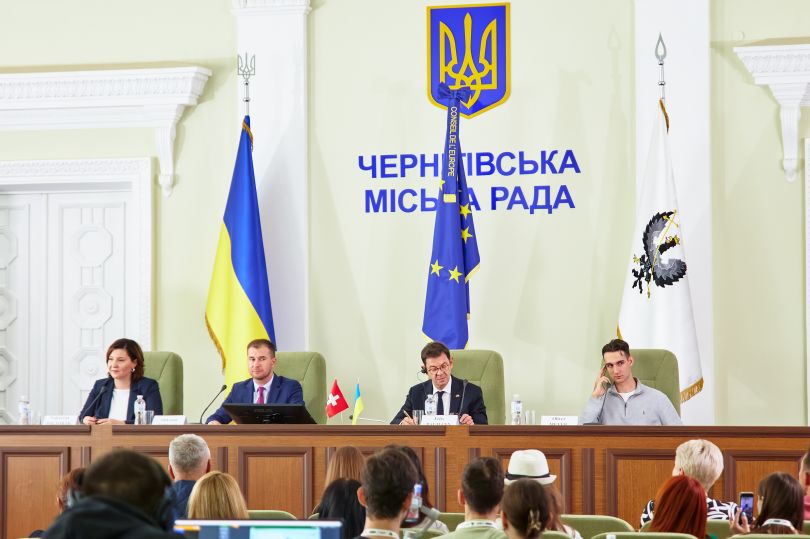
Back to your work in Chernihiv. How did you learn about the city’s transportation problems, and how did the idea to provide buses come about?
Oliver: Yeah, the transportation shortage in Chernihiv was identified by the DECIDE project team led by Valentyna Poltorak. She was the one who chose this city as an aid recipient because we did not have local contacts in order to show exactly where to provide aid. The idea of providing buses appeared after a discussion with the Swiss Embassy, which stated it was ready to help.
We returned to Switzerland and started to look for donations of buses. Switzerland also financed transportation, repairs, and we solved various logistical challenges that emerged.
How did you actually get a hold of the buses? Did you just go into the mayor's office and say, "Give us 11 buses for Ukraine!"? (Laughs) How did it all begin?
Oliver: We went to the mayor of St. Gallen and said, figuratively speaking, "knocked on her door" and asked if they could give buses to support Ukraine. Because we already had some experience with organizing this aid, we contacted companies, cities, and organizations to let them know about this opportunity for donating buses. Then our Ukrainian partners knew who received these vehicles.
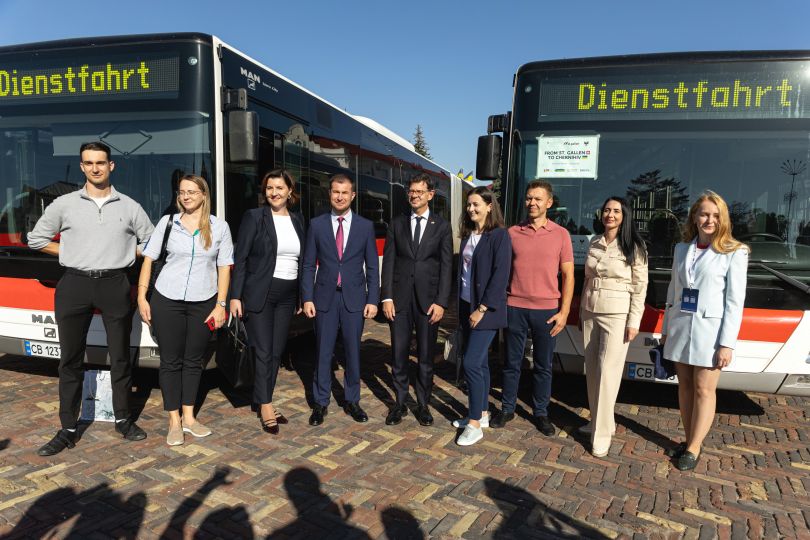
What was the toughest part of the project?
Oliver: The hardest part was trying to work out the details. There was no previous history of a project just like this, so we were uncertain as to how to go about transporting these buses or who would pay for what and how to manage contracts. And we certainly hadn't any earlier experience in moving big vehicles, so as these issues came up we had to work these things out. Our organization, St. Gallen Helps Ukraine, was greatly helped by the Ukraine-Switzerland Bern Association, initiated by Olena Krylova..
What are your plans for the future? Are there some projects of this kind you'd like to undertake?
Oliver: We want to keep on helping. Since now, we know how to do it, we are looking for further opportunities to provide more buses to Ukraine.
